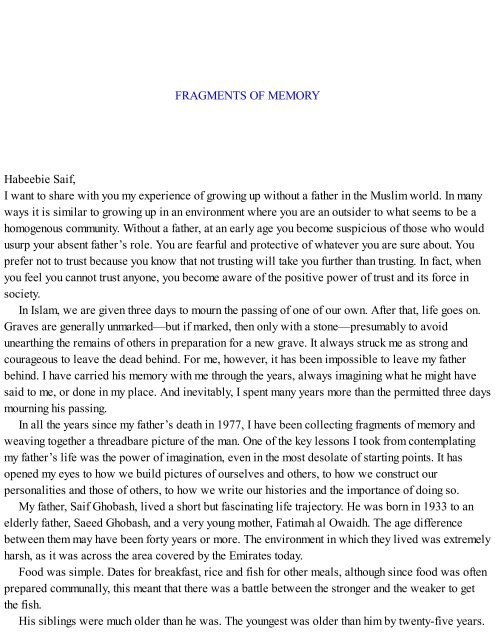1250119847
Create successful ePaper yourself
Turn your PDF publications into a flip-book with our unique Google optimized e-Paper software.
FRAGMENTS OF MEMORY<br />
Habeebie Saif,<br />
I want to share with you my experience of growing up without a father in the Muslim world. In many<br />
ways it is similar to growing up in an environment where you are an outsider to what seems to be a<br />
homogenous community. Without a father, at an early age you become suspicious of those who would<br />
usurp your absent father’s role. You are fearful and protective of whatever you are sure about. You<br />
prefer not to trust because you know that not trusting will take you further than trusting. In fact, when<br />
you feel you cannot trust anyone, you become aware of the positive power of trust and its force in<br />
society.<br />
In Islam, we are given three days to mourn the passing of one of our own. After that, life goes on.<br />
Graves are generally unmarked—but if marked, then only with a stone—presumably to avoid<br />
unearthing the remains of others in preparation for a new grave. It always struck me as strong and<br />
courageous to leave the dead behind. For me, however, it has been impossible to leave my father<br />
behind. I have carried his memory with me through the years, always imagining what he might have<br />
said to me, or done in my place. And inevitably, I spent many years more than the permitted three days<br />
mourning his passing.<br />
In all the years since my father’s death in 1977, I have been collecting fragments of memory and<br />
weaving together a threadbare picture of the man. One of the key lessons I took from contemplating<br />
my father’s life was the power of imagination, even in the most desolate of starting points. It has<br />
opened my eyes to how we build pictures of ourselves and others, to how we construct our<br />
personalities and those of others, to how we write our histories and the importance of doing so.<br />
My father, Saif Ghobash, lived a short but fascinating life trajectory. He was born in 1933 to an<br />
elderly father, Saeed Ghobash, and a very young mother, Fatimah al Owaidh. The age difference<br />
between them may have been forty years or more. The environment in which they lived was extremely<br />
harsh, as it was across the area covered by the Emirates today.<br />
Food was simple. Dates for breakfast, rice and fish for other meals, although since food was often<br />
prepared communally, this meant that there was a battle between the stronger and the weaker to get<br />
the fish.<br />
His siblings were much older than he was. The youngest was older than him by twenty-five years.
















